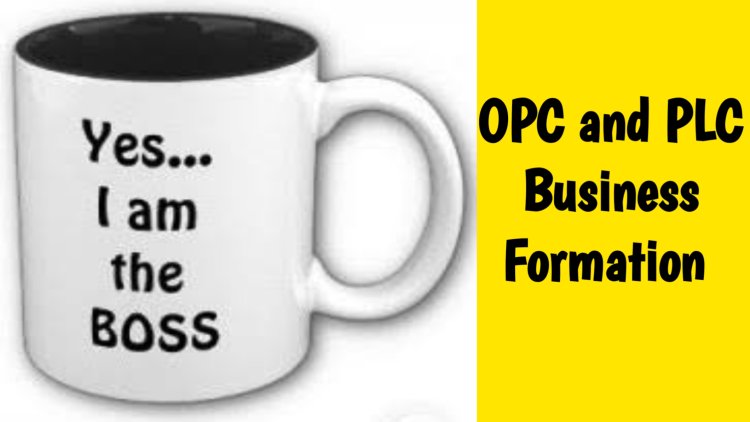one person private limited company (OPC),private limited company and sole proprietorships
what are the main similarity and difference between one person private limited company (OPC),private limited company(PLC) and sole proprietorships and which business types of formation more advantageous

What is one person private limited company?
A one person private limited company (OPC) is a type of business structure specifically designed for solo entrepreneurs who want to operate under the legal framework of a limited liability company with only one shareholder. In essence, it allows you to enjoy the benefits of a company (like limited liability and separate legal identity) while functioning as a single owner.
key features of an OPC
- Single member: As the name suggests, an OPC can have only one individual as a member and shareholder. This means you have complete control over the business decisions and profits.
- Limited liability: Your personal assets are protected from business debts and liabilities. Only the company's assets are at risk.
- Simple setup and compliance: Compared to a traditional private limited company, an OPC has fewer compliance requirements and a simpler registration process.
- Minimum capital: In some jurisdictions, OPCs might have a lower minimum paid-up capital requirement compared to private limited companies.
- Conversion requirement: Some countries might mandate the conversion of an OPC into a private limited company if the annual turnover or paid-up capital exceeds certain thresholds.
What situations where an OPC might be a good choice:
• You are a freelancer or solo consultant wanting to operate professionally.
• You are launching a startup and plan to bring in more investors later.
• You require limited liability protection for your business.
• You want to maintain a simple and cost-effective business structure.
However, there are also some limitations to consider:
• Single-person dependence: The success of the business heavily relies on you, the sole member.
• Funding options: Accessing bank loans or external funding might be more challenging for an OPC compared to a company with multiple shareholders.
• Public perception: Some investors or clients might prefer doing business with a company with more than one founder.
A one-person private limited company (PLC) in Ethiopia offers a unique business structure for aspiring entrepreneurs with some key advantages and considerations:
Advantages:
- Simpler setup and administration: Compared to other company types, forming a one-person PLC involves less paperwork and bureaucratic hurdles. You can act as the sole shareholder and director, streamlining decision-making and management.
- Limited liability protection: Like any PLC, your personal assets are shielded from business debts and liabilities. This provides valuable financial security.
- Tax benefits: One-person PLCs may qualify for specific tax incentives in Ethiopia, potentially reducing your tax burden.
Considerations:
• Minimum capital requirement: You'll need to invest a minimum paid-up share capital, currently set at 10,000 Ethiopian Birr, to register your PLC.
• Reporting requirements: While simpler than other structures, you'll still need to comply with annual financial reporting and other legal obligations.
• Access to finance: Securing loans or investments might be more challenging compared to larger companies. Banks may require additional guarantees or security for one-person ventures.
• Exit strategy: Reselling your shares or dissolving the company can be more complex for one-person PLCs compared to companies with multiple shareholders.
According to Ethiopia Trade and Tax law when does actualy started such types of business formation
One-person private limited companies (OPCs) were officially recognized in Ethiopia with the implementation of the Revised Commercial Code (Proclamation No. 1243/2021), which came into effect in March 2021.
However, there was a delay in putting the relevant provisions into practice. The existing business licensing law still required at least two members for PLC registration, despite the new code allowing for OPCs.
This bottleneck was finally addressed in July 2023, with the passage of the New Business Licensing Proclamation. This legislation paved the way for the official registration and licensing of OPCs in Ethiopia.
Therefore, while the legal framework for OPCs was established in March 2021, they only became practically operational in July 2023.
Here's a timeline for your reference:
• March 2021: Revised Commercial Code introduces OPCs
• July 2023: New Business Licensing Proclamation allows OPC registration
So, it's important to remember that although conceptualized earlier, one-person private limited companies only truly "started" functioning in Ethiopia in July 2023.
what are the diffrences between a private limited company (PLC) and a one-person private limited company (OPC)
Here's a breakdown of the key differences between a private limited company (PLC) and a one-person private limited company (OPC) in Ethiopia, keeping in mind the safety guidelines you outlined:
Number of Shareholders:
- PLC: Requires at least two distinct shareholders. This means shared decision-making and potentially diverse perspectives.
- OPC: Only allows one individual shareholder, offering complete control but potentially lacking in diverse viewpoints.
Formation and Compliance:
- PLC: Has a slightly more complex registration process and ongoing compliance requirements compared to an OPC.
- OPC: Offers a simpler and relatively more streamlined setup and compliance process due to its single-owner structure.
Limited Liability:
- Both PLC and OPC: Enjoy the benefit of limited liability, meaning personal assets are generally protected from business debts and liabilities.
Minimum Capital:
- PLC: May have a higher minimum paid-up capital requirement compared to an OPC.
- OPC: Might have a lower minimum capital requirement, making it potentially more accessible for solo entrepreneurs.
Funding Options:
- PLC: May have easier access to bank loans and external funding due to its multiple ownership structure.
- OPC: May face certain challenges in securing loans or investments due to its single-member nature.
Conversion Requirement:
- OPC: Some jurisdictions might mandate the conversion of an OPC into a PLC if the annual turnover or paid-up capital exceeds certain thresholds.
Suitability:
- PLC: More suitable for businesses with multiple founders, requiring shared decision-making and potentially seeking external investment.
- OPC: Ideal for solo entrepreneurs seeking a simple and cost-effective business structure with complete control.
what are the main diffrence and similarity between sole proprietorships and one-person private limited companies (OPCs)
Both sole proprietorships and one-person private limited companies (OPCs) have their place in the Ethiopian business landscape, but they offer different benefits and drawbacks. Here's a breakdown of the key differences to help you choose the right structure for your venture:
Legal Framework:
- • Sole Proprietorship: Not a separate legal entity from the owner. The owner's personal assets and liabilities are tied directly to the business.
- • OPC: A distinct legal entity from the single shareholder. Offers limited liability protection, meaning your personal assets are shielded from business debts and obligations.
Registration and Compliance:
- • Sole Proprietorship: Simpler and less expensive to register. Requires basic documentation and business licensing.
- • OPC: Requires more steps and documentation compared to a sole proprietorship. Needs specific company filings and compliance with the Revised Commercial Code and New Business Licensing Proclamation.
Taxation:
- Sole Proprietorship: The owner's personal income tax applies to all business profits.
- OPC: The company pays a separate corporate income tax on its profits. Dividends to the single shareholder are then taxed as personal income.
Control and Decision-Making:
- • Sole Proprietorship: You have complete control over all business decisions and operations.
- • OPC: You retain full control, but operate as a formally registered company with defined shareholder rights and responsibilities.
Raising Capital:
- Sole Proprietorship: Limited options for borrowing or attracting investors. Relies primarily on personal funds or bank loans based on personal creditworthiness.
- OPC: May have better access to financing and investments as a formal company with limited liability protection. However, attracting funding might still be challenging compared to larger companies with multiple shareholders.
Transferability and Succession:
- Sole Proprietorship: Selling the business involves transferring all assets and liabilities to the new owner. Succession can be complicated and uncertain without prior planning.
- OPC: Shares can be easily transferred, allowing for smoother ownership changes or future inclusion of additional shareholders.
Ultimately, the choice between a sole proprietorship and an OPC depends on your specific business needs and goals. Here are some general recommendations:
• Choose a sole proprietorship if: you are a solo entrepreneur with a simple business model, prefer minimal paperwork and compliance, and don't require limited liability protection.
• Consider an OPC if: you value limited liability protection, foresee potential future growth or investment needs, desire a more formal company structure with defined shareholder rights, or plan to eventually bring in additional owners.
Both sole proprietorships and one-person private limited companies (OPCs) have their place in the Ethiopian business landscape, but they offer different benefits and drawbacks. Here's a breakdown of the key differences to help you choose the right structure for your venture:













